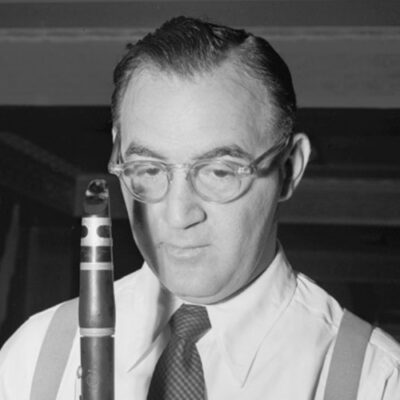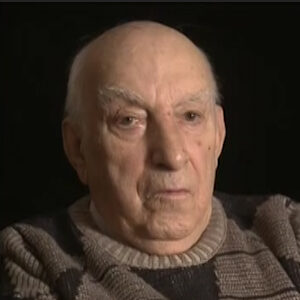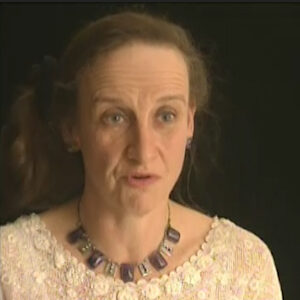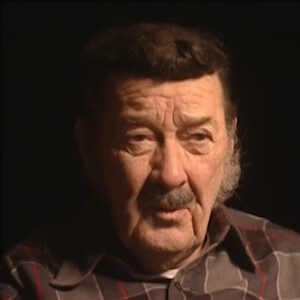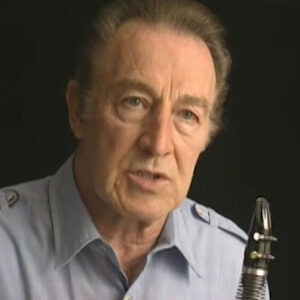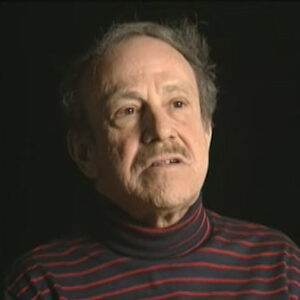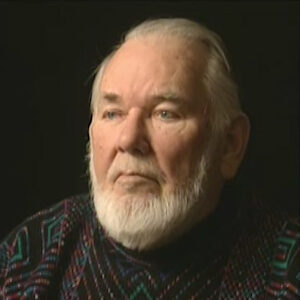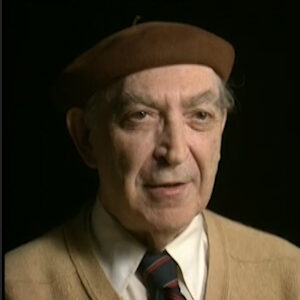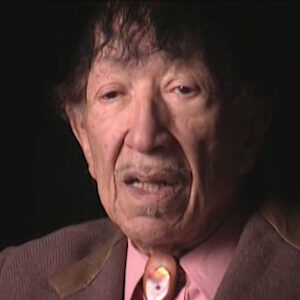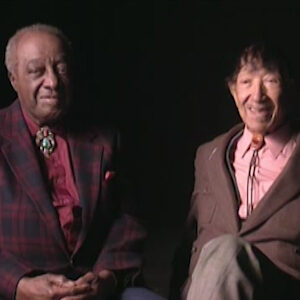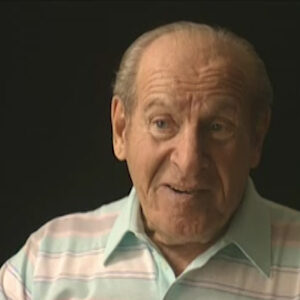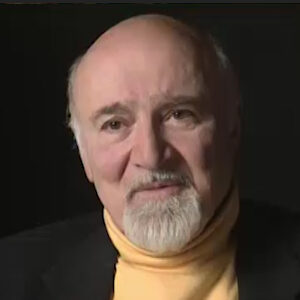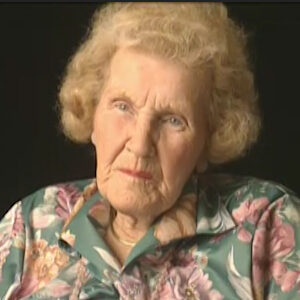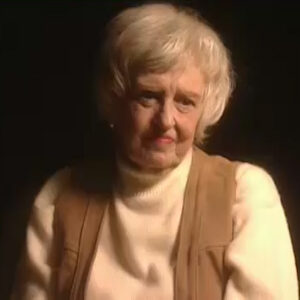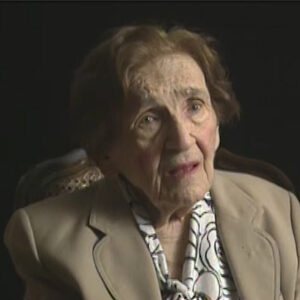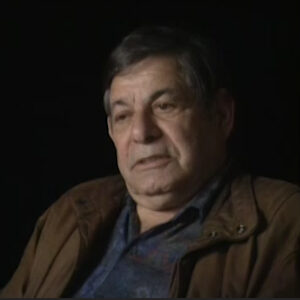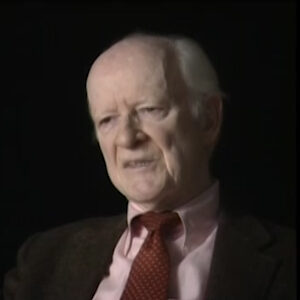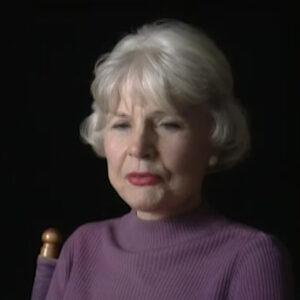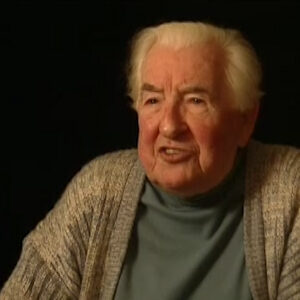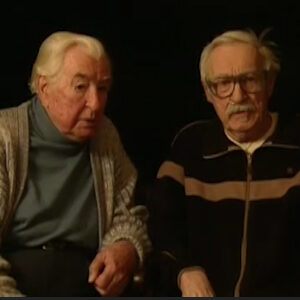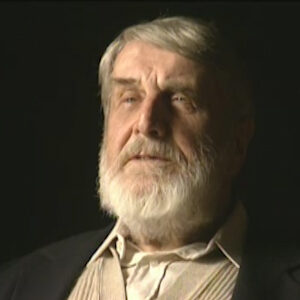Speaker Well, you just come into play, but do a little little loop at the ending of one of the commercials to get into what they were doing for swing in the spring program. Was anything special when you met him?
Speaker Well, I was a big thrill because I’ve always admired him from from an audience at the Paramount Theater or some some other place where he lives or the radio. I heard him a lot on the radio.
Speaker Maybe we should be giving know, I should mention, before my questions won’t be there. So you can start these things, if you will. OK. That’ll be great if you were a fan. Listen, I had to know when he was on the radio. Come on, let’s dance. Right. And if a song can tell about that period of your life, if you were a teenager.
Speaker Well, I was playing I was studying with my uncle who played guitar with Buddy Rogers. Bobby Dominic. Played guitar. Taught me how to play. And the one thing I always remembered is that he always said the best band is Benny Goodman. And there were a lot of bands in those days and the commercial bands were played more on the radio than the jazz bands. But Benny really did have the best band in the long run. When I think about it, it was hard to beat.
Speaker What were they?
Speaker Well, they had a swing and they had some daring players in the band. You know, they had Charlie Christian and I had Gene Krupa and Johnny Canary and a great brass section with Harry James and Jimmy Maxwell, all superstars. And I got to play with a lot of them later on in my career.
Speaker What was frankly, it’s hard for people today to get a sense of when radio was the thing and people listening to radio or when bands struggle was like being, how old were you when you got back?
Speaker Well, the radio was the only source of listening to these bands. And all the bands did what we called remote and those days, and they either came from the Meadowbrook or some Balram in across the country anywhere where the bands were playing. They always had a hook up and it went local. Sometimes it went network. And all the hotels and Lincoln, the Commodore Hotel, the Pennsylvania Hotel, I think had a lot to do with the success of all the bands because everybody heard them across the country.
Speaker Did you have a favorite show like you make your schedules around a show?
Speaker I actually did. I heard the one of my favorite guitar players from Chicago, George Minds, who I later teamed up with after school at Run Home and had it marked on the dial on the radio. In fact, we both played for four Benny. Later on in life.
Speaker Tell me about it.
Speaker Well, that was thrilling because we took a bus from Patterson, New Jersey, where it was born and we spent all day there, we’d see two or three shows and it was it was glorious. And, you know, when I heard those bands, I said, I want to play with one of them.
Speaker They want to understand that big bands play how they play like a movie. OK. Fill in the picture. And so what year it was and how old you were getting the details?
Speaker Well, Benny’s band would be playing at the Paramount Theater, which meant that he would do from five, maybe six on weekend shows after the main feature and after the news and the coming attractions. So it was just one continuous show that just went on and on. If you were a big fan of Benny’s, you could sit there all day long, just take a sandwich along and listen to all this great music for 75 cents.
Speaker And you came in.
Speaker How are you? Well, we came. We came in on Sunday.
Speaker Yeah, I was going to high school and we all got on the bus, all the musicians, and we made a day out of it. And it was a lot of fun, I’ll tell you. And very inspiring.
Speaker Did you get to know any the guys in the band?
Speaker No. We got an autograph here and there. And I saw Alan Ruess, who played guitar with him and Charlie’s Charlie’s used to be on the Seventh Avenue and they all used to hang out there between shows and run back to the Paramount, do another show.
Speaker Did you ever go there’s a. Still, there’s early signs.
Speaker Hurleys was on there on the corner where NBC was. Forty ninth. And the sixth was that. Oh, that was for that for hang out for all the radio musicians and a very successful radio me musician in those days did. Maybe 30 shows a week. And Benny was included in those. He used to do a lot of shows with Artie Shaw as a studio musician. And then they did so many shows that they did him back to back. And they’d pay the elevator man just to be ready from one studio and jump on to another. You know, they’d have a sub go mark all the parts and then they rush to the next studio for the next show, which was right after the one they just did.
Speaker Was it as if you were in high school then when the war came recording that that change had a big impact on musicians lives? Were you you were playing with Benny. How did you get a picture of how that changed?
Speaker Well, when the war came on, I, uh, I was I was turned to war, had already been on. And I turns 18 and I had just joined the Volman Rose band as soon as I graduated high school. But the army got me as soon as I turned 18 and I, I spent three or four months on the road with Volman Row, and that really added to to all the excitement.
Speaker And I said, when I come out, that’s what I want to do.
Speaker So we did that and it was there was definitely sort of the whole while the music was now bebop start against, you know, my okay.
Speaker The music now turned to be bop with Charlie Parker and Dizzy Gillespie, and it was a new new ballgame and a dance band business was fading out. And it was like, yeah.
Speaker It’s fading.
Speaker Well, when the war was over, there was a new music, new music. And I said, yeah, when the war ended, there was a new music. I came back from the service and I happened to hear a little scraps of somebody’s beep up on the radio in the Manila. That’s where I finished up in the service. But it was Dizzy Gillespie and Charlie Parker. And now all the bands start to fade out because of the dance business was too expensive. Now to take a road.
Speaker The band on the road and Benny, I guess, tried to be by a band. I know we did.
Speaker And I think he got very discouraged and I think he stopped at that point and they just gave it up and just stayed low. And a lot of other bands just sort of faded out. And the band I was with stopped in 1953 52. And all the musicians now scramble into New York to get on the recording end of it because the records were very big. Hit record was very big and they were all trying for their big hit and all the singers were not that with the bands. Now became a single artist. Sinatra, Doris Day. And there was no more dad’s business. You couldn’t go to Pottstown, Pennsylvania, anymore. Play for dance. Now you had to play a concert and that’s what it evolved to.
Speaker We have a narration for the film from that day himself recording for a radio, and he talks about how he really preferred playing. Oh, definitely.
Speaker But I want to share that with you.
Speaker Yeah. Danny was an artist that playing a dance job, and he took forever to think about the right tempo for the next piece. And everybody thought he was in a dream world, but he was thinking about that temple one, two, three, and he kicked off the band. It was always a right temple, which is which is was he had the people in mind all the time and a few times where we had a concert to play. We were separate, separated by a large dance floor. And that meant that the audience was half a block away. And then some people on the side and one side and someone the other, Bernie, would get up to the mike and scrap the concert. I’ve seen him do this many times. He said, let’s go gather around the bandstand and we’re gonna dance tonight.
Speaker And that’s what the sextet did talk about the sextet, the various forms, whether you really prefer playing with the sextet or just an economic revival. And certainly, you know his work on the most outstanding achievements.
Speaker Yeah, well, his famous sextet made a great record of Rosewarne with Charlie Christian Account Bass Giorgio. And I think Benny favorite playing were with a group like that as a big band. But he did enjoy the big band, too.
Speaker You know, Billy, he drilled a big band. He always get the saxophones and haven’t go over passages, you know, and and sort of get them all worked up. And he got great enjoyment out of it. But I think in the long run, when we did a big job band, sometimes the band would only play three or four numbers. He’d be he’d be jamming all night long with the sextet.
Speaker Can you describe what it was like playing? I mean, in that little collaborative group, that’s what’s so special that you’re all playing off each other and everyone says you got inspired by hand by Teddy or by you and how that interaction. Well, musically, I’ve worked here.
Speaker He loved to be in a band with Zoot Sams and Bobby Hackett, Hank Jones and those those kind of musicians gave him a little kick. And when he got that kick, he was off and running because he would really get off and start playing beyond Benny Goodman. He was fabulous. And when he played with a big band, my my recollection of going to England with an all British band in 1970, I think they were waiting for Benny all their lives just to play that book with Benny. And we rehearsed in London for three or four days because he was there a little early and I was but I got there last three days of rehearsing and they just played unbelievably great for Benny. And in the course of these concerts, Benny would still revert back to playing Honeysuckle Rose and Lady Be Good with a small group and a little jam session.
Speaker He always loved that of the talk to your child. Did you ever get a sense of what she meant?
Speaker You know, I hate my question. Oh, yeah.
Speaker He never mentioned Charlie too much to Mahima. He asked me once if I know Charlie’s chorus on Stardust. I told him no. That was the end of it. But I think the reason I play with Benny is not to play solos, just to play rhythm guitar for.
Speaker I think that was a very important thing in those days because he he didn’t he didn’t care about the solos. He’d like the band, the sound. Right. And he wanted to hear that that rhythm section. And I think I know how to do it because I was thinking about all my life, you know, when I was since I was going to high school.
Speaker Unusual usual among musicians, and it became fairly friendly with it was went beyond just playing with you.
Speaker All right, you guys, I wonder you know why. I think it can happen.
Speaker Well, it was after the the European tour, 1970. We were there for six weeks. We did twenty six cities. And it was very successful. And I had a career of recording in New York. I was doing The Tonight Show with Skitch Henderson. And I was doing a lot of recording work and just something told me to get out of here and go do that tour with Benny, you know. And I think was the best thing I’ve ever done. But when I got back, I was home about three or four weeks and my wife says Benny called. So he said, come on over. I want let’s play together. So the two of us will play up to the apartment on the Sixty Sixth Street. And we sat there all afternoon just playing one tune after another, you know. And that small little just a dual guitar and clarinet. And we even had done it at night. And from then on, Benny would always call me like eight o’clock in the morning at nine o’clock in the morning, said, you want to come over today as well. I got a session this afternoon at 2:00. I’ll see a ten and no plays and I have to leave. But it was that kind of a thing. Benny would come over the house as well. And he always has clarinet with him. So we’d always play either at his house or my house or up at his apartment. We even played at Ethel’s house one one time during the holidays. He invited me over for dinner and he had his horn.
Speaker We played two or three numbers. And then I have a great meal with Ethel.
Speaker I’ve I’ve heard it was a great food. And you mention something about meals at your house. Oh, yeah. Did he say anything about that? That he was married.
Speaker Well, he’d like to do things on the spot. You know, Benny never.
Speaker He would call me on us on a Saturday morning or Friday night and say, I’ve got a gig in Scranton, Pennsylvania. And he says, how do I get there?
Speaker I said, you’ve got to pass my house first. And then you if you’re going on to New York and you’re gonna catch a plane, you may as well drive down as well. If I drive down, I stop at your house. So my wife would make some spaghetti or lasagna. And he would bring a bottle of wine. And then and he’d stop, have dinner, maybe take a nap and jump in the car and go on to Scranton. This is after I was playing when I when they were doing the job with him.
Speaker You know, you talked earlier about tempo and how he was very careful about saying he had a lot of trouble with drugs through the years. You know, like you said, being in the rhythm section of the with guitar and a particular sense of rhythm to be able to play with.
Speaker Well, I see with Benny, when Benny played a number, he didn’t want everybody to join and he wanted everybody to know where that temple was. By the way, he was playing the song.
Speaker And then when you came in, if you came in ahead of them or behind them and bug them.
Speaker So I had a knack of watching his foot all the time. And that besides listening to him or watching his foot, that combination I could always follow.
Speaker You see, a lot of musicians would dive in ahead of them and then he would stop and, you know, and give him a hard time.
Speaker Did you ever see the famous, right?
Speaker Oh, yeah, sure. Well, I always said that he never fired anybody.
Speaker You know, you just look them down and he just made it miserable for them. If he didn’t like them and if they were giving him a hard time, he he could give it back much faster than anybody could give it to him. And he just made guys quit and just pick up and leave. He did. We were talking about it the other night about MLSE. Alexandru played drums with them on another tour, a short tour with Zoot Sims, and he called a little rehearsal after we had made a long trip on a plane.
Speaker And we drove in Mannheim, Germany.
Speaker And Miles, he was chewing gum and Benny said, Don’t you go. This is at a rehearsal.
Speaker So Mallozzi had a REM’s shot and said, this is like being in the Army, you know.
Speaker Then Benny would say, well, if you don’t like it, you get out of here, you know? And then it turned out that we did a concert without the drums that night and we all ran over the mouse’s room. That after rehearsals. Come on. Come on. A job. Well, Malusi never played that night. We played the whole concert without drums. But he and Marzi were good friends anyway. So later on, for Miles, he had a heart attack and he had a setback. Benny was the first one over there with it. Big, big check. And the.
Speaker There was gonna be a big benefit for MLSE a week after, and Bennett came over and said, listen, I can’t make the, uh, the affair with Buddy and Zoot Sims. And everybody said he says he has a chicken and mouse. Gee, thanks, Muñiz. Thanks a lot. The man said it’s only scale.
Speaker Are there any sort of other particular anecdotes about your relationship with them?
Speaker Well, when we played the White House and all the years that Benny was in the business, I think he only made one recording session with Buddy Rich. And that this time we were doing a thing in Washington for for Reagan. And he said he will decide the call Buddy and Buddy came down with Hank Jones, Milt Hinton and myself, and we played forty five minutes for, uh, uh, Hussein from Jordan. King was saying, and it was spectacular and Benny’s eyes were rolling around that night because he was he said to me, Oh, this guy can play the drums in an under his voice because Benny always like Gene Krupa and Gene Krupa and Buddy were always. You know, bumping heads here.
Speaker Talk to bedsheet or about any. Oh, he loved Gene Krupa. Yeah, that was his favorite drummer. He love them.
Speaker You know what, it was the same thing with what you were describing before, but coming at the time, what was you see when one Benny used to play?
Speaker Body and soul or any any song, no matter even a jump to. There is a tempo there that even the dancers can can formulate from that from what Ben doing. You know, you don’t have to have the drum playing for you to know where the beat is. And that was a great mark of bands playing where you knew were where the beat was, the way he played those eighth notes. The swing was there and his playing all the time.
Speaker So Kapa.
Speaker I mean, this sense you describe of Benny and his playing is that it was a very relaxed thing and you would call you up and it would be you get together. But when you think about it’s kind of an astonishing thing. Here was this guy in his 70s still playing. And I mean, it’s to it’s that was not like, you know, two or three hours a day. It’s like all day. That’s right. Something else. Tell him about that and get something if you can’t. If you think that he was driven to do it or if it was he loved it or if it was that he was so determined to keep on top of it.
Speaker Benny was. Driving himself always to play music, classical music and swing, now I would get to a parliament some days and he’s there when a classical piano player playing a very heavy classical piece. And the minute they finish in. He would get up and play a jazz bass before the piano player would leave. And on Sundays, once we went up to his house and he played a whole long Brahms piece for us, that must’ve taken 40 minutes, just he and a piano player. But he loved it so much that if he missed a day, I think I think he was cheated because he loved to play that clarinet even on a road before we’d get to it to a job. He would say, let’s play a couple tunes before we go out. We’d play a few times before we’d go on stage at Carnegie Hall. We’d sit in a room and just just to warm up.
Speaker And you would go by how he had a sense of would be really swan. And the music is so called swing music. And I was so surprised because it was a jazz swing. Right.
Speaker I mean, I’m curious, can you describe rather than getting some credit. Tell us about what it was about.
Speaker You’re your version of what swaying is. What?
Speaker Well, Ben used to take them a melody and get a beat out of it. And he would syncopate the song. And know if if I if I may just whistle aside, if I say you turn the tables on me, Bob Hope will do to date. That’s what Bennett would do. And it was written straight up and down. But Benny would always give it that little little click. And that’s what he was known for. He swung the melody and the melody gets to the people.
Speaker You said you mentioned Jimmy Maxwell in the trumpet section. He’s one of you. Can you tell us about Jimmy or set him up? Introduce him?
Speaker Well, Jimmy was one of the great powerhouse first trumpet players. And I got to play with him on NBC staff when I played with Skitch Henderson. And he was there with Doc Severinsen. And Chris Griffin was there not on NBC, but there. I’ve done a lot of recording sessions with all of those trumpet players at different times, again, musically.
Speaker What what was special about the trumpet sections to Chris?
Speaker Well, they listen to what Benny wanted. And they they gave Benny what he wanted. Harry James was there. Sometimes peewee urban was there. And lots of times when he was looking for a great trumpet player, a younger one, he’d always revert back to one of the old old guys. You know, he said, I need a guy like that to play.
Speaker Did you get a sense at the end of his career he was still trying to recapture something from the past? Sustained by playing. It didn’t matter.
Speaker Well, his music was so good. It’s still still good. You could get a band together. But without Benny, it’s tough.
Speaker You know, Benny, Benny knew how to walk out onstage with the wire, with his clarinet. You know what? To hold it when he wasn’t playing there. A lot of clarinet players don’t like being at all the clarinet, you know. Not the way Benny did. He had a lot of clout when he walked out on stage and when he played No.
Speaker One, he didn’t play. Still look great all class.
Speaker That’s definitely what I feel about.
Speaker Well, he was a great dresser and he always dressed up the band. And when we when I first played with with Benny, we all had tuxedos on and we had patent leather shoes and we had a little booth near every night of fresh flower. And he was a he was right about that. But now it’s not like that anymore.
Speaker Did he ever talk to you about his childhood or his upbringing or about how effective that had not?
Speaker Not really. Tell me about what he wanted when he played in Chicago. He went to a whole house. I think Milton was there with him, too. The bass player. And once we did a a concert for that, for that in Chicago, you go back to the house where he got the present.
Speaker No, I haven’t.
Speaker Somebody gave me a recording of that movie and Bud together. German somebody’s coming down here.
Speaker John McDonough, again, I, I don’t have any other specific questions, but if there’s anything else that you can think of to help capture who he was or some aspect of to help us.
Speaker Well, Benny was the one of the greatest instrumentalists of all times for the whole world. And when he played that clarinet, I mean, he owned it. He wrote a book on it because he made more recordings. He played with more musicians.
Speaker And that’s another thing that he he advised me years ago. He says if you’re going to make records, make records with as many different people as you can. And Benny did the same thing. He played with Tommy Dorsey, played with all the musicians.
Speaker And when they did a record date, he was on it. When he did a record, they were on his sessions. So it didn’t matter even till the end. We had with some of the last recordings we dealt with Benny. We had Jovanotti and the George Benson. So we had both both ends of the spectrum. You know, he loved Jovanotti.
Speaker He gets a lot of credit for integrating jazz.
Speaker Right. That’s true. Beginning. Do you ever get a sense of him being aware of that place opened up?
Speaker He never mentioned that. He just had them play. He didn’t care. He just went along. And they played. That’s it. He was he was happy. He loved, you know, Teddy Wilkes until he had Teddy on his last show. And Teddy was in bad shape in those days, you know, and slammed the same with slams door. You know, he I think Benny fired his brother, the put slam Stewart in the band and they made to hit records the next day.
Speaker Well, the Paramount Theater was across the river from Paterson, New Jersey.
Speaker And I was going to high school and all our music, my musician friends.
Speaker I was thinking, OK, all right, bye.
Speaker I was associated with Zoot Sims in the 70s. We played a little club together, just guitar and tenor saxophone. And he told me a story about the longest solo we ever play with Benny was when they were making a picture in Hollywood. And they were doing a rehearsal and the rehearsals just kind of long. So Zoop brought an apple and he left and I was on a stand and they got into one number. And Benny says, take a course. And so I got up to play.
Speaker And while he was playing, Benny picked up the apple and started eating his apples.
Speaker So he said, the zoot take another course. It took three choruses until we finished the zoot sample. So I never played it so much that long before that chucklehead story.
Speaker I play hard to find. It’s just in the background. You want to get a clear objective.
Speaker That was fine.
Speaker Again, the paramount paramount Paramount was just across the river from Patterson, New Jersey, like a 50 cent bus ride. And on Sundays, all our musician, friends, kids, we all play in high school with the sign. They go see Benny Goodman and we would go to the Paramount and maybe just get in in the balcony. And after the first show, we read your way down.
Speaker And then the next show would be over. We’d get closer and closer by the third show or fourth show. We’re right in front of the band, you see.
Speaker So that was the thing everybody did in those days. You didn’t stay in one spot. But if you were lucky to get there early in the morning, you get the first seat.
Speaker And what was it like when your reaction when you discovered there was a new generation like this guy?
Speaker He embraced that. I know he heard a lot of records.
Speaker He had asked me about this. The saxophone player in that section of planets, I can’t stand them. I said, not Scott, but these contemporary saxophone players. I said, that’s not your thing. You know, I’d like to hear guys play the same way you do. And that’s the way Zoot played and that’s the way Benny played.
Speaker You listen to your records still, you often don’t have a collection.
Speaker But I do what I do. It’s very thrilling. I’ll tell you, when you hear the simplicity of the arrangement that was Fletcher Henderson and the sort of things there, everyone, it is a jam.
Speaker They’re all they’re all winners.
Speaker Do you ever talk to you about the arrangement about Fletcher?
Speaker Yeah, he likes I think he like Fletcher more than anybody.
Speaker I mean, he had some great, great writers write for me. Skip Martin, everybody. In fact, I played one of Skip Martin’s greatest records called Sharra Jazz.
Speaker And it was it was the Hollywood Bowl Orchestra and a and a Hollywood jazz band with Conrad guys on all the heavyweight musicians on the West Coast. And they will go from the classical to the jazz, from the classical to the jazz. It was very well put together. It was done in the 50s and I played it for months. I said, hey, I like that record. He said, it’s great. He says, we get rid of the symphony.
Speaker Because the band really played beautifully.

